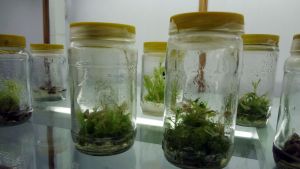From Stability to Prosperity: Understanding Costa Rica's Success
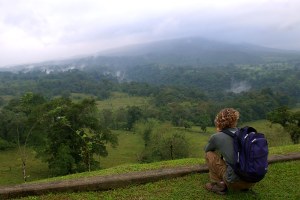 Play Podcast
Play Podcast
About the Episode
What is the secret to Costa Rica's exceptional success as a politically stable and environmentally sustainable nation? While other countries in Central America struggle with political upheaval, violence, corruption, and extreme poverty, Costa Rica has become a global example of success with robust institutions, visionary policies, and a thriving eco-tourism industry. The Atlantic Council’s María Fernanda Bozmoski joins Deep Dish to discuss the reasons for Costa Rica’s achievements, explore lessons for other countries, and unpack the challenges that lie ahead for this remarkable nation.
[Brian Hanson: INTRO: This is Deep Dish on Global Affairs— going beyond the headlines on critical global issues. I’m your host, Brian Hanson, with the Chicago Council on Global Affairs.
Today, we are going to try to solve a mystery – namely, why is Costa Rica one of the most politically stable, environmentally sustainable, and happiest countries in the world – not to mention a fabulous eco-tourism destination? This success is especially surprising because Costa Rica is located in a region, Central America, marked by civil wars, political upheaval, gang violence, political corruption, and chronic poverty. Thousands of refugees flee Guatemala, El Salvador, and Honduras to the US to escape these conditions. Panama has gained a reputation as a world capital for money laundering and corruption, and Nicaragua suffers from a brutal authoritarian regime.
Yet, Costa Rica, a nation of about 5 million people, has captured the attention of the world with its stability, robust institutions, visionary policies, a diversified economy, and an eco-tourism nirvana. So, what are the reasons for Costa Rica becoming a global example of success? Are there lessons that can be learned by other countries? And, let’s be honest, no country is as ideal as it is portrayed in its tourism brochures– we also want to look the challenges and concerns facing the country’s future?
Here with me to unravel this mystery is María Bozmoski. Originally from Costa Rica, María is the deputy director of programs at the Atlantic Council’s Latin America Center, where she leads the center’s work on Mexico and Central America.
So, Costa Rica has sustained a civil democratic governance since 1949, but Maria says that hasn't always been the case and that they did have a 44 day revolution back in 1948...]
Maria Fernanda Bozmoski: The government in power didn't recognize the results of the February 8 election at the time. There was a businessman, Jose Figureres, everyone in Costa Rica knows about him, decided that that wasn't right and led an insurgency against the government. Uh, the government was allied with the communist, party, and they lost, there was a provisional government for 18 months and after that, Jose Figueres knew that there should be an election. And, uh, 1949 we had a new constitution. And since December 1st, 1948, we haven't had an army. Um, and that's one of the fun facts I think of Costa Rica, is that there's no army. And that also means that any money and resources that would go to maintaining these forces can actually be invested in other parts, in other areas. That I think helps understand kind of the people of Costa Rica. we like to say we're a peaceful nation. there's the saying Pura Vida, which means pure life. And we don't know what it's like to see, military forces on the street. police forces carry guns, but not like what you see in other parts of the world. I do think that that's important in order to understand the Costa Rican way of life, that being said it's hard to understand, to wrap your head around. Why Costa Rica is so peaceful in, a region that is so convoluted, where crisis is, the word of the day. I mean, there's something new that's happening, in every country, almost weekly. I will say that lot of Costa Rica's stability and security and a ability to attract foreign direct investment comes down to the lack of an army.
Brian Hanson: I was working in the US Senate in the 1980s and spent a lot of time in the region, you know, proxy wars going on in, Nicaragua, El Salvador and the whole region was, you know, really a bloody mess. and obviously the military was one of the sources of power, right? And, and I'm wondering, how did Costa Rica during those times of turbulence where there's active war going on in the border areas, how did they provide for their security? And was there a temptation to say, you know, actually a military might be pretty good to keep this stuff out of our country.
Maria Fernanda Bozmoski: You know, I'm trying to think if there's ever been a political party or a movement in the country that has called for a return of the military. I just really don't see it in our DNA. I mean, with all due respect to the forces and, people who serve in the militaries around the world, just Costa Rica, that's just does not fit there's a lot of advantages when you're a small country, right? today we're 5 million people. but. Before, we were always a relatively small country, very also decentralized. and I think that that's also helped because, you have some sort of state presence all throughout the country. and from that comes ability to do business. I will say that one of the advantages of, Costa Rica is, It's a small populace that we have and also we've been blessed by geography, right? Costa Rica means rich coast. We're one of the few countries, in Central America that has access to both the Pacific and the Atlantic coasts and while we do not have a canal..
Brian Hanson: Yeah, like Panama does! Yeah.
Maria Fernanda Bozmoski: One of the challenges that we have is that infrastructure, roads and trains aren't really well developed in Costa Rica, but I think that geography and demographics have really been an advantage.
Brian Hanson: So, let me ask about, political dimension in the age of democracy. this record from 1949 forward is really remarkable in a region in which, there been many forces, right? Costa Rica's been strongly aligned by the United States, but communism and communist parties played a big role in the history during the Cold War of the region and all. Could you describe a little bit about what has the political dynamics been in Costa Rica and what are the ranges of views? The other thing that strikes me is it's not a single party state, right? You can create stability with a single party state, but there's actually been democratic competition. what should we know about the nature of democracy and how it's evolved in Costa Rica?
Maria Fernanda Bozmoski: Yeah, were a presidential system with a unique Cameral Assembly. There's quite a few political parties, but it's also not as fragmented as you'd see in other parts of Latin America, like Peru or even, we just had elections in Guatemala. there was like over 30 parties that were running for the presidency.
Brian Hanson: Wow.
Maria Fernanda Bozmoski: And I think, a handful of them disappeared because they didn't reach the quota to stay alive. So, Costa Rica has a plurality of parties, but we also have always had some traditional parties. And for a, the longest time there was sort of an alternates of powers between the traditional parties, I'll say the PLN, which is Jose Figueres party, the National Liberation Party, and the PUSC, which is the more like Social, Democrats party. Um, there was a long sort of, they would alternate being in power. and I think Costa Rican politics for the most part, until probably the election in 2022, was very, predictable, kind of boring actually because you wouldn't see big surprises, until the most recent election when Rodrigo Chavez's party, which is a new party, came into power.
Brian Hanson: Let me ask about that a little bit cuz one of the things we've seen around the world has been the rise of populist parties and kind of a breakdown in many places of the traditional party structures. You talked about the stability that existed in Costa Rica. Has populism affected Costa Rican politics? And does it threaten to upend some of the political arrangements that have been key to success?
Maria Fernanda Bozmoski: The current party, and the current president Chaves, he's a technocrat, was a former finance minister, worked at the World Bank for many years, had been out of Costa Rica for 30 years and came and he ran as a political outsider and as we've seen in the rest of Latin America, he came with a message that the population really liked. He wasn't part of the establishment, he wasn't part of the status quo. he came in with new ideas, and sort of a clean slate, right? and that's something that we've seen reverberate throughout the region is, citizens embracing outsiders. And I think inevitably, with that comes a little bit of populism, just the way that he campaigned. We've also seen recently, in the last few months, that the Costa Rica's democracy isn't as strong as it used to be. And there's been some, attacks on the press. I think that populism is something that we're seeing in the region, in the world. It's emerging. It's something that Costa Rica's not immune to.
Brian Hanson: So, one of the things that struck me as I was just kind of getting familiar for our conversation is in some of these social policies like education and health, really remarkable statistics. like at 98% literacy rate, in the country and in terms of health, second lowest infant mortality rate in all of Latin America. I think only behind, Chile. Could you talk a little bit about what are the key social policies that are important to holding that country together, providing the stability for the population there?
Maria Fernanda Bozmoski: Yeah, health and education are the two social policies that Costa Rica's really proud of. And I think these two were key for Costa Rica's accession to the OECD, the Organization of Economic Cooperation and Development.
Brian Hanson: Which is usually known as kinda the Rich Country Club. The Club of Rich countries. Right?
Maria Fernanda Bozmoski: After a very long time, after very hard fought reforms, Costa Rica, qualified to make it into this club. Costa Rica's the 38th member and is only the fourth in Latin America. It's Mexico, Chile, Colombia, and Costa Rica. Costa Rica is an example on the social side, uh, health Costa Rica spends, 7.5%. Whave universal health coverage through what we call the kaha, the Costa Rican Social Security that everyone contributes to. healthcare is seen as a Right. It's not a constitutional right per se, but it's intrinsic to Costa Rica. um, and education as well. Investments, in education are 6.5% around that. And these numbers are remarkable, after the pandemic. Costa Rica was one of the countries that, fared the best, with its response to the pandemic Vaccines were widely available, through the covax mechanism. Costa Rica was a part of that. and it's, true that, it makes, a difference. A lot of the reason that international companies, especially US companies invest in Costa Rica is because of the strong human capital, because they know that Costa Ricans speak English. So, investing in the population really is, a great way to see a return on investment. But Costa Rica has one big problem in my opinion, and that's our fiscal deficit.
Brian Hanson: So, basically spending more than you're taking in tax revenues, right?
Maria Fernanda Bozmoski: Exactly. And not unlike, many countries in Latin America, Costa Rica has very low, capacity of, tax collection. the base is not wide enough, and you have a large part of the population that it is in the informal sector, obviously not as big as, for example, Guatemala or El Salvador. Some of the northern triangle countries where it's almost 7 in 10 people are part of the informal sector. In Costa Rica, it's more like, 4 in 10, but it's still significant.
Brian Hanson: And that's a really nice transition to the economy more generally, because it you know, really is interesting, compared to the other countries of the region. many people in the United States think of it primarily as, the eco-tourism industry, which is a huge industry there, right? but also, you know, there's a generalized high standard living with a diversified economy. And one of the things I was surprised by is leading medical device industry, right? and, you know, high tech companies like Microsoft and Intel and hp, Google, Amazon. All have a presence there. Biotech industries are big alongside with the traditional, agriculture. What has allowed Costa Rica to develop that kind of economic diversity and profile? Cuz you look around at its neighbors and there's nobody, none of the other countries have economies that look like this.
Maria Fernanda Bozmoski: I would Name the social policies as one thing that has attracted companies to come to Costa Rica. The other big driver of, this, investment. And pull factor for a lot of companies is the free trade regime zones. So, the government offers a number of incentives to any company from wherever. if you install your operations in one of these big industrial parks, you have exemptions on taxes, uh, you have custom duties on imports and exports. It's really a good deal. It makes a lot of business sense. Obviously, as well, Costa Rica is able to sell its geographic position as a bonus. It's close to the us, same time zone, and it's right next to Panama, so you can take advantage of the Panama Canal. Uh, you have over, 250 US companies that, translate into 126,000, jobs, just Intel back in 2021, invested a billion dollars in Costa Rica. They recently opened a new assembly and test factory, and they provide over 3,500 direct jobs. So, it becomes a virtuous cycle. Right. Like the companies see this, and, mutually reinforcing they attract other companies. So, a big trend right now in, in the United States and the world is, this nearshoring, right with the Americas Act, other initiatives that have come out of the US Congress to bring back companies to the Western hemisphere and Costa Rica really is in a position to benefit from that.
Brian Hanson: So, one of the things that I learned, in my high school physics class was the idea of entropy, which is everything falls apart all the time, and in order to create order, it takes energy. And one of the things that really strikes me as we've gone through these areas of politics and social policy and economy, is that there has been a set of very intentional policies put into place and produced, reproduced, and built on over time in order to drive that virtuous, circle that you just talked about, which has been so valuable to Costa Rica. Is that because there's been political consensus around this? Or how do we understand why that set of policies has been able to be sustained for 75 years? I mean, it's really impressive!
Maria Fernanda Bozmoski: I think it really also goes back to the point I was making earlier that politics in Costa Rica, in the grand scheme of things, are pretty boring. When you look at the administrations, since 1949, there really hasn't been a big change, its mostly center right, center left, some difference on social policies, positions on, uh, gay marriage or abortion. Uh, remember that Costa Rica is one of the few, uh, Still Catholic states. we're not a secular state, so that influences politics a lot. But you don't get this sort of, like windshield wiper politics you've see in other parts of the world. Like for example, Brazil in the bigger countries, right? So, there's kind of been the same direction that the country has been going in, and maybe going back to your point about physics, it's just inertia and it's the momentum that's there, but it's worked and if it ain't broken, why fix it? Right.
Brian Hanson: Yeah. Yeah! Let me just address some of the challenges that, exist. Obviously, Costa Rica, like every country, is in a neighborhood. We've talked about how, unique it is in this neighborhood, but one of the things that is, true throughout Central America is the challenges that have been created by the drug trades gangs, developing, controlling these, trades. And I know that Costa Rica has experienced increased in murder rates and activities. To what extent is that a threat and the way that we've seen it devastate some of the neighbors? I mean, Mexico, perhaps, most notably. how big a deal is this going forward?
Maria Fernanda Bozmoski: Yeah. Security narco trafficking has become a big issue in the last, since Covid, I would say.
Brian Hanson: Mm-hmm.
Maria Fernanda Bozmoski: Even so, this is something that I think is very unique to Costa Rica as the country. A few months ago, there was a peak in homicides. The security situation was really in a way getting out of hand and former presidents, got together and came to the current government, and, said, we're here to help. I don't think that's something you really see in other countries, especially not in, our neighborhood in Costa Rica. it is a big issue it's part of the path for narco trafficking, for drugs. A lot of migrants also are coming through, Costa Rica and the country's institutions don't really have the capacity to deal with the influx of, refugees and migrants who are making their way up to the United States I think that we're seeing it is sort of a balloon effect up in El Salvador with his very, mono lura sort of ironclad security strategy. That has resulted in 2% of the adult population being incarcerated. You see some of those gangs, looking for new destinations and looking for new hubs. and what better place than a peaceful country? It is a very real issue that, the government has acknowledged this is a priority to address because it has very real repercussions on the ability of companies to do business. And it has a. An effect on tourism. recently the State Department elevated its alarm for Costa Rica. and so that has very real repercussions also for citizens who depend on tourists coming and enjoying Costa Rica.
Brian Hanson: Yeah and is there close security cooperation with the United States on these issues of narco trafficking and, gangs? That's been a point of contention with some neighboring countries, but what's the relationship between the US on these issues in Costa Rica?
Maria Fernanda Bozmoski: Yeah, the us and Costa Rica have a very close security relationship and cooperation. Costa Rica works very closely with other countries in the neighborhood, Colombia and Panama. A lot of police training takes place in Panama. and we have some special forces that, yes... special forces with quotations, right? Who addressing these issues. one of the biggest issues as well the security ministry has had quite a bit of turnover. so been an additional challenge in addressing security issues at the moment.
Brian Hanson: Mm. One of the things that can have its own momentum and it also can feed into the environment in which this kind of violence can happen is economic inequality. And a moment ago we were talking about the kind of the new sectors, you know, tremendous economic opportunities for some, and you noted earlier that somewhere around 40% of the people work in the informal economy. So, they don't have regular jobs. They aren't part of, that. To what extent is economic inequality an important issue for shaping the future of the country? And to what extent is the country trying to deal with those challenges?
Maria Fernanda Bozmoski: Yeah, economic inequality becomes perhaps more exacerbated in a country where the cost of living is quite high in comparison to the other Latin American countries and as a result of the war on Ukraine, Costa Rica's been seeing some second and third order effects, and inflationary pressures, right? So, it's more expensive to go to the grocery store and buy eggs and bread and beans. Costa Rica doesn't fare all too well on the genie, coefficients…
Brian Hanson: Which is a measure of inequality, right? The relationship be either richest in the poorest in society. Yeah.
Maria Fernanda Bozmoski: Correct. It's one thing that remains, a longstanding, I would say, structural issue that, again, COVID exacerbated. the people who have these informal jobs do not have the luxury of working from home when you know there's a pandemic and there's a threat to your livelihood. So, social and economic inequality, is an area in which I frankly believe that Costa Rica needs more support from multilaterals and from the international community. the OECD should help us. Come up with innovative policies and solutions on how to address the problem of inequality. because in the long run, it, creates resentment and, something that we're starting to see and it's just not sustainable as a country, if you want to continue being competitive. I mean, it, behooves you to make sure that people have access to opportunities and people are able to live in your country.
Brian Hanson: This connects to something that you mentioned a little bit ago, about budget deficits. And I was just thinking about that virtuous cycle that we are discussing, which requires investment, right? And requires investment in education and requires investment in health. It requires investment in people. How big a threat is that deficit and what can be done and who needs to partner with Costa Rica in order to address that problem in order to keep this virtuous cycle going forward? or could it, you know, really face a major disruption that could undermine what's been going so well?
Maria Fernanda Bozmoski: The fiscal deficit, still remains a problem, because if you don't have the revenue to support robust social agendas like many Costa Rican administrations have had in the past, and I don't foresee any future ones changing that anytime soon. If you don't have the revenue to support those expenses, then obviously your deficit grows. Right? Back in 2019, we, hit a record of 7% of fiscal deficit that was concerning. Some experts estimated that it could reach double digits if nothing was done. Um, However, in 2018, the Costa Rican national legislature came together, worked on a fiscal reform. We're starting to see the fruits of that reform last year, 2022. We ended with a deficit of close to 2.5%. Costa Rica is, working with the IMF, the International Monetary, fund to address the longstanding issues that, pose a threat to the financial stability of the country. there is a recognition and acknowledgement that there are reforms that still need to be done to secure a path towards the sustainability of public finances.
Brian Hanson: And what are examples of some of the things that are on that agenda?
Maria Fernanda Bozmoski: Broadening the tax base, is one of them also, making some slight modifications. Currently, Costa Rica, if you're at a higher tax bracket, you get more tax breaks, which is counterproductive, right? So those who have more means should be contributing more to. The government coffers than somebody who has fewer means. there are also some proposals to work with the free trade zones, and the sort of tax breaks that they give the government or the companies that come to Costa Rica creating, a tighter schedule where those tax cuts and breaks kind of decrease a little bit. So, you're still not disincentivizing companies from coming, but you're still collecting more taxes from the presence of these companies.
Brian Hanson: So, I wonder if we step back from this conversation, what strikes you as lessons from Costa Rica's experience that might be applicable in other places, either in the region or more broadly, which might offer some guidance, some possibilities for countries that are currently struggling to move on to a more productive path and have a story to tell, like Costa Rica's.
Maria Fernanda Bozmoski: So, Costa Rica, a few decades ago decided to bet on one sector, medical devices, and the high tech kind of chips That's worked really well. Costa Rica is known around the world, for these industries. So, I think that looking for your comparative advantage--what sectors can countries, specialize in that would give them an edge and make them more competitive on the global scale. As I think about the other countries that I work in, what could they also learn from Costa Rica is, are these investments in health and education? This also kind of environment forward mentality that Costa Rica has that has really worked. it's part of the secret sauce that makes Costa Rica a stable and pretty moderate growth, even in post covid. So, investing in the populations is really a way for countries to see a return on investment. that way you attract companies, that way you can also, to a certain extent, prevent brain drain. Those to me are some of the things that are lessons learned, so to speak for other countries.
Brian Hanson: María Bozmoski of the Atlantic Council, I want to thank you so much for being on Deep Dish and helping us unravel this mystery behind Costa Rica's remarkable success, as well as recognizing some of the challenges that exist.
Maria Fernanda Bozmoski: Thanks, Brian.
[Brian Hanson: OUTRO: And thank you for tuning in to this episode of Deep Dish!
A reminder that we want to hear more from you, our listeners. So, send us an email or, better yet, a voice memo, to deepdish@globalaffairs.org -- You can suggest issues you’d like us to cover, guests you’d love to hear from, or you can just let us know how you think we’re doing.
And if you are looking for more Deep Dish in your podcast diet? Tap the “follow” button in your podcast app so you get each new episode as it’s released. If you think you know someone who would like today's episode, please "share" it with them!
As a reminder, the opinions you heard belong to the people who expressed them and not the Chicago Council on Global Affairs. This episode is produced and edited by Kyra Dahring and mixed by Frank McKearn from Aphorism Productions.
Thank you for listening. I’m Brian Hanson and we’ll be back next week with another slice of Deep Dish!]




Related Content
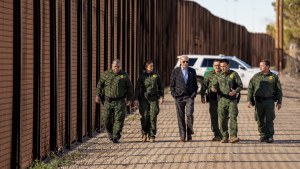 US Foreign Policy
US Foreign Policy
US sanctions on Latin American countries have exacerbated the worsening economic and political conditions behind the current migrant surge.
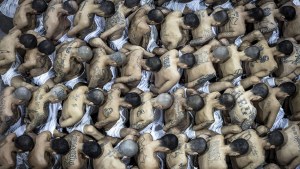 Human Rights
Human Rights
Mass arrests have reduced crime in the short-term—but at a significant cost to human rights.
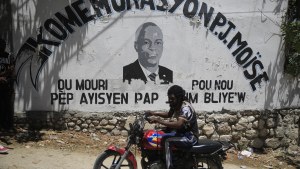 Defense and Security
Defense and Security
From corruption to inequality, underlying factors hinder Haiti's progress post-President Moïse's assassination.
